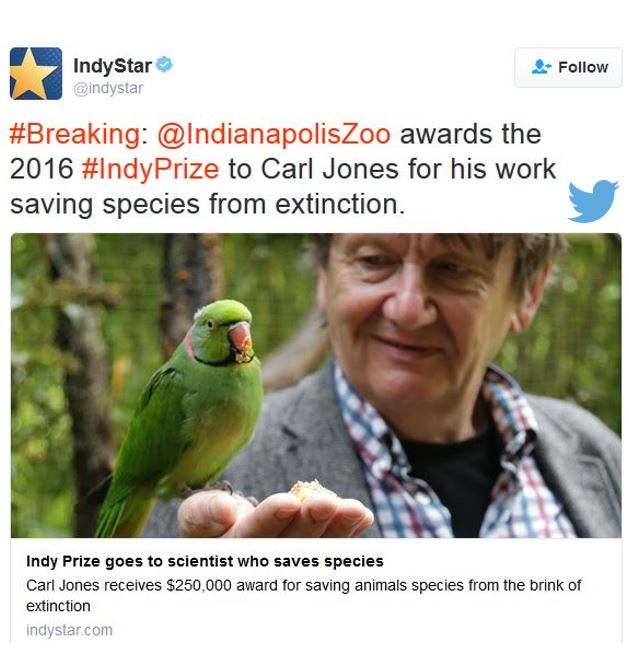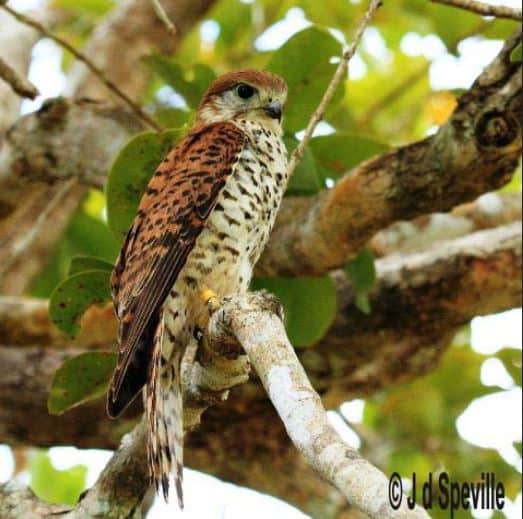Professor Carl Jones, from Carmarthen in Wales, has won this year’s prestigious conservation prize – the 2016 Indianapolis Prize – for saving at least nine animal species, literally rescuing them from certain extinction.
Prof. Jones, who saved the echo parakeet and pink pigeon among other species during his four decades of work in Mauritius, will be given the £170,000 ($250,000) prize later this year in London.
The International Union for the Conservation of Nature (IUCN) says that without Prof. Jones, the natural world today would be a significantly poorer place.
 Had it not been for Prof. Carl Jones, several wildlife species would currently be extinct. (Image: twitter.com/indystar)
Had it not been for Prof. Carl Jones, several wildlife species would currently be extinct. (Image: twitter.com/indystar)
Saved from the brink of extinction
Several plant and animal species would today be extinct, and far fewer people would have been encouraged to take up the conservation cause, had it not been for Prof. Jones, who is Durrell’s Chief Scientist and Scientific Director of the Mauritian Wildlife Foundation.
Durrell Wildlife Conservation Trust wrote in a press release:
“We are delighted to that he is the winner of the prestigious Indianapolis Prize 2016, the ‘Oscars’ of the conservation world.”
Simon N. Stuart PhD, Chair of the IUCN Species Survival Commission, said regarding Prof. Jones’ work:
“I know of no other conservationist who has directly saved so many species from extinction.”
 Thanks to Prof. Jones, more birds have been saved from extinction in Mauritius than in any other nation on Earth. (Image: durrell.org)
Thanks to Prof. Jones, more birds have been saved from extinction in Mauritius than in any other nation on Earth. (Image: durrell.org)
An ‘inspirational’ story
The Durrell Wildlife Conservation Trust describes Prof. Jones and his story as ‘inspirational’, and wants to share it with the whole world – the conservation approaches that he has pioneered, the globally-significant results he achieved, and why he is ‘a hero worthy of this award’.
Prof. Jones devoted forty years of his life to pioneering work in Mauritius, together with the Mauritian Wildlife Foundation. He developed and led the programs which enabled some of the most astonishing animal population recoveries on Earth.
Thanks to his efforts, the Rodrigues fody, Rodrigues warbler, echo parakeet, Mauritius olive white-eye, Mauritius kestrel and pink pigeon have been brought back from the brink of extinction.
These programmes, many of which used hands-on animal husbandry techniques that had been developed in several zoos across the world, have attained results that are truly world-leading.
Of the sixty-three mammal, bird and amphibian species across the globe that have been down-listed on the IUCN Red List thanks to conservation, Prof. Jones was programme leader in six of them.
Professor Ken Norris, Director of Science at the Institute of Zoology, Zoological Society of London, said:
“If Carl’s pioneering step was his approach to species conservation, then his second was his recognition of the need to restore whole ecosystems.”
 Prof. Jones’ pioneering work saved the Mauritius Kestrel (above) from extinction – in 1974 there were just 4 individuals. There are more than 400 of them now. (Image: mauritian-wildlife.org)
Prof. Jones’ pioneering work saved the Mauritius Kestrel (above) from extinction – in 1974 there were just 4 individuals. There are more than 400 of them now. (Image: mauritian-wildlife.org)
Regarding Prof. Jones and his being awarded the Indianapolis Prize, the Mauritian Wildlife Foundation said:
“The Indianapolis Prize honours an individual who has made an extraordinary contribution to conservation efforts involving a single animal species or multiple species. This biennial award brings the world’s attention to the cause of animal conservation and the brave, talented and dedicated men and women who spend their lives saving the Earth’s endangered animal species.”
About Prof. Carl Jones
Conservation biologist Professor Carl G. Jones, MBE, was born in Carmarthen, Wales in 1954. He has worked for the Durrell Wildlife Conservation Trust since 1985 and is a co-founder and current scientific director of the Mauritian Wildlife Foundation.
Prof. Jones is also Chief Scientist at the Durrell Wildlife Conservation Trust, and an honorary professor in Ecology and Conservation Biology at the University of East Anglia in Norwich.
He is a strong believer in the importance of knowing your species and using your empathy, practical knowledge and intuition over dogmatic education.
He is best known for his remarkable work in saving the Mauritius kestrel (Falco punctatus) from extinction. There were just four individuals in 1974 – thanks to a programme which he led, their numbers increased to over 400.
He has worked in the Mascarene Islands since 1979. The Mascarene Islands are a group of islands in the Indian Ocean consisting of Rodrigues, Mauritius and Réunion. Prof. Jones has led five successful bird-rescue projects, where numbers had declined to fewer than 12 individuals.
As a consequence of his work, Mauritius has averted more certain bird extinctions than any other nation.
He studied for his BSc at North-East London Polytechnic. In 1978, he started his master’s degree at the University of Wales in Swansea. He began by studying developmental strategies in owls, but the opportunity to run the conservation project in Mauritius saw him alter the title of his research to ‘Studies on the Biology of the Critically Endangered Birds of Mauritius’.
He then completed a PhD at the University of Wales, studying the pink pigeon (Nesoenas mayeri).
The Indianapolis Prize website made the following comment about Prof. Jones:
“Passionate about animals since childhood and inspired by the famous British conservationist Gerry Durrell, Carl has dedicated his life and career to restoring endangered animal populations and habitat, approaching conservation with a clear understanding of the necessary balance within an ecosystem.”
“He is responsible for developing and leading successful recoveries for reptiles, mammals and birds, including the pink pigeon, echo parakeet and, most famously, the Mauritius kestrel. Carl brought the total population of the rarest bird on the planet from only four individuals to nearly 400 over the course of a decade.”
About the Indianapolis Prize
The Indianapolis Prize is a globally-recognised animal conservation program and award that was established in 2005.
The Prize was created to bring people’s attention across the world to the cause and celebrate the individuals who have made extraordinary contributions to the sustainability of Earth’s fauna and flora.
It is the largest individual monetary award given for animal conservation globally, and is one of the ways that the Indianapolis Zoo empowers communities and people, both globally and locally, to advance animal conservation.
Video – The 2016 Indianapolis Prize Winner: Carl Jones
As this Indianapolis Prize video explains, Prof. Jones has truly saved species on the brink of extinction. “Whether he’s protecting the Mauritius kestrel or the pink pigeon, his decades-long dedication to restoring endangered animal populations and habitats is inspiring a lasting conservation legacy.”
